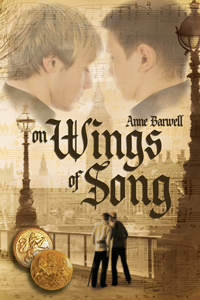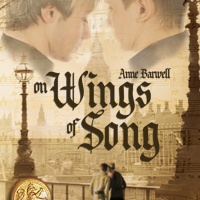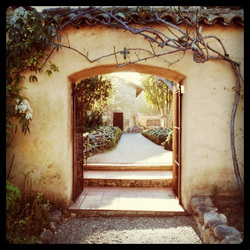- Home
- Circles
- El Corazon
-
Sentries
- The World of Sentries
- Marked Yours (Book #1 of Sentries)
- Together Bound (book #2 of Sentries)
- Chained Hearts (Book #3 of Sentries)
- Collared Souls (Book #4 of Sentries)
- Tethered Pair (Book #5 of Sentries)
- Ringed Love (Book #6 of Sentries)
- Free Read--Take What's Yours
- Free Read: Heart, Home & Hearth
- Free Read: Fox Tails
- Sentries series reviews
- The Sleepless City Shared Universe
- The Vampire Guard
- Edge Jump
- For the Long Run
- High Test
- Whiskey and Moonshine
- Pain and Pleasure
- Strays
- 29 Hours to Eternity
- Subscribe to my Newsletter
- About Me
- Thoughts and Things Blog
- Translations
- Book Bundles
- Free Reads
- My Fan Fiction Collection
- Complete Privacy Policy
 Publisher: Dreamspinner Press Cover Artist: TL Bland Publisher: Dreamspinner Press Cover Artist: TL Bland Thanks, Elizabeth, for hosting me today. One of the things I love about writing an historical is the research. I always learn something new, and often my discoveries shape a part of that story. Although there is a lot of information on the internet, I prefer to read a mix of hardcopy and online. I guess a part of that is because I work in a library. With On Wings of Song I watched several movies and mini-series which were set during WWI and the time either side of it. I’d already read a lot of fiction, and watched movies set during the early part of the 20th C, including both World Wars and the time between, so was familiar with it. All the same, it never hurts to watch and read more, and with the centenary of the war this year, there are a lot of new movies and books being released, which is great. One of my early discoveries when I started reading The Forgotten Voices books were that some of the men involved in the 1914 Christmas Truce exchanged uniform buttons in lieu of gifts. This was something I knew had to be a part of On Wings of Song, and the buttons Jochen and Aiden give each other become an important part of the story. Another very helpful source of information—also containing personal anecdotes—was Stanley Weintraub’s book Silent Night. But apart from reading about the truce itself, I also needed to read about other parts of the war as the truce is just the beginning of Jochen and Aiden’s story. Aiden takes part in the first Battle of the Somme in 1916, and Jochen is at Mons in 1918. I wanted to show both sides of the war, rather than just favouring one side or the other. I chose the Somme as one as I’d already read a fair bit about it for another story I’d written. My other choice was in part because of events that had happened around the Armistice in 1918. These battles shift the action forward in time from 1914, to 1916 to 1918 when the war ends. The war is just the beginning of the story. The rest of the story takes place in 1920, almost six years after Aiden and Jochen originally meet. I’m familiar with Music Hall as I’ve played for the modern equivalent, Musical Theatre, but I still had to find songs for the performance Jochen goes to. There’s more on that and the research I did on tea rooms and literature in other posts. I also needed a location for Lavender Cottage, which Jochen inherits from his Great-aunt Wilhelmina. With that I got very lucky. Crayford, in Bexley, where the cottage is, has a website. Not only do they have modern photographs, but many taken in the early 1920s, so I was able to look at photographs of the time and get a decent feel for the area at the time. I’ve used several real locations and changed others to suit the story. While it’s not always possible to be completely accurate when writing about another time period, I try to write it as authentically as I can, and hopefully do it, and those who lived then, justice. Research is a big part of writing historical fiction, and although I might be daunted by the amount involved, it still pulls me back to write more. Blurb: Six years after meeting British soldier Aiden Foster during the Christmas Truce of 1914, Jochen Weber still finds himself thinking about Aiden, their shared conversation about literature, and Aiden’s beautiful singing voice. A visit to London gives Jochen the opportunity to search for Aiden, but he’s shocked at what he finds. The uniform button Jochen gave him is the only thing Aiden has left of the past he’s lost. The war and its aftermath ripped everything away from him, including his family and his music. When Jochen reappears in his life, Aiden enjoys their growing friendship but knows he has nothing to offer. Not anymore. Excerpt: “I’ve seen it,” Aiden said quietly. “I wish to God I hadn’t.” He looked directly at Jochen. Jochen met Aiden’s gaze. He’d seen an echo of Conrad’s fire in Aiden when he’d talked about his music earlier that afternoon. “Don’t die on the wire, Aiden.” “I’ll try not to.” Aiden’s words were an empty promise. They both knew it, but what else was he going to say? The red-haired man Aiden had spoken to about arranging the burials walked over to him. He too held a shovel, and he wiped perspiration from his brow despite the cold. “There’s going to be a combined service for the dead,” he told them. “In about ten minutes in no man’s land in front of the French trenches.” As they made their way over, men were already beginning to gather, soldiers from opposite sides sitting together, conversation dwindling to a respectful silence. A British chaplain stood in front of them, a Bible in his hand, a German beside him. Jochen recognized him, although he didn’t know his name. The young man was only a few years older than Jochen and was studying for the ministry—would he ever get the chance to complete those studies? Jochen and Aiden found somewhere to sit a few rows back from the front and joined the company of men. The German spoke first. “Vater unser, der du bist im Himmel. Geheiligt werde dein Name.” The British chaplain repeated the words in English. “Our Father who art in Heaven, Hallowed be thy Name.” They then spoke a few words each, some from the Bible, the rest from their hearts. Their congregation was silent apart from a few quiet “amens.” Jochen saw a couple of men wipe tears away. He was close to it himself. Finally the chaplain bowed his head in prayer. When he’d finished, he spoke quietly to the man who had come to stand next to him. It was Captain Williams. He nodded and looked over the crowd, his gaze fixing on Aiden. Aiden must have guessed what Williams wanted. He inclined his head in response and then stood. Jochen glanced between the two men, confused. What did Williams expect Aiden to do? “Aiden?” Jochen asked softly. Aiden smiled at him and began to sing. “O Holy Night, the stars are brightly shining….” He lifted his head, his voice strong and clear, each note building on the last to create something truly beautiful, something angelic. Aiden’s eyes shone; his body swayed slightly in time with the music. He was the music. His audience sat in awe. Jochen could feel the emotion rippling through the men around him, tangible, as though he could reach out and touch it. He felt something inside himself reach out, wanting to be a part of it, to be carried along the wave of pure music, to grab it and never let go. Meet & Connect with Anne BarwellAnne Barwell lives in Wellington, New Zealand. She shares her home with two cats who are convinced that the house is run to suit them; this is an ongoing "discussion," and to date it appears as though the cats may be winning. In 2008 she completed her conjoint BA in English Literature and Music/Bachelor of Teaching. She has worked as a music teacher, a primary school teacher, and now works in a library. She is a member of the Upper Hutt Science Fiction Club and plays violin for Hutt Valley Orchestra. She is an avid reader across a wide range of genres and a watcher of far too many TV series and movies, although it can be argued that there is no such thing as "too many." These, of course, are best enjoyed with a decent cup of tea and further the continuing argument that the concept of "spare time" is really just a myth. Comments are closed.
|
Welcome to My World
|
All contents copyrighted 2011-2023
Affiliate, monetized links maybe used on this site.
Affiliate, monetized links maybe used on this site.
- Home
- Circles
- El Corazon
-
Sentries
- The World of Sentries
- Marked Yours (Book #1 of Sentries)
- Together Bound (book #2 of Sentries)
- Chained Hearts (Book #3 of Sentries)
- Collared Souls (Book #4 of Sentries)
- Tethered Pair (Book #5 of Sentries)
- Ringed Love (Book #6 of Sentries)
- Free Read--Take What's Yours
- Free Read: Heart, Home & Hearth
- Free Read: Fox Tails
- Sentries series reviews
- The Sleepless City Shared Universe
- The Vampire Guard
- Edge Jump
- For the Long Run
- High Test
- Whiskey and Moonshine
- Pain and Pleasure
- Strays
- 29 Hours to Eternity
- Subscribe to my Newsletter
- About Me
- Thoughts and Things Blog
- Translations
- Book Bundles
- Free Reads
- My Fan Fiction Collection
- Complete Privacy Policy




 RSS Feed
RSS Feed




